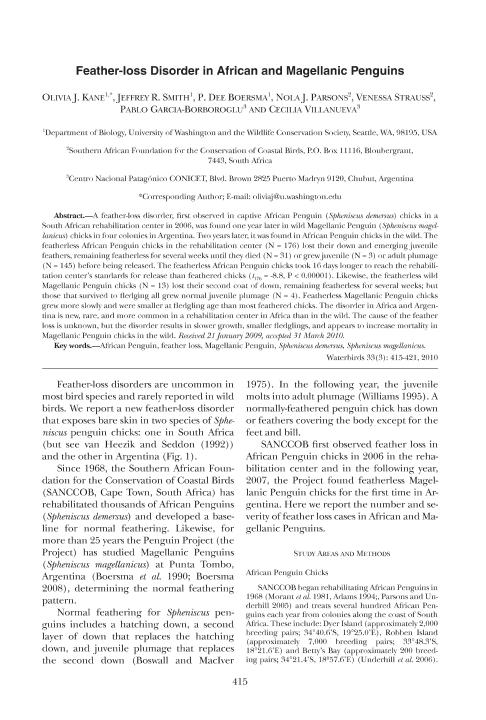Mostrar el registro sencillo del ítem
dc.contributor.author
Kane, Olivia J.
dc.contributor.author
Smith, Jeffrey R.
dc.contributor.author
Boersma, P. Dee

dc.contributor.author
Parsons, Nola J.
dc.contributor.author
Strauss, Venessa
dc.contributor.author
Garcia Borboroglu, Jorge Pablo

dc.contributor.author
Villanueva, María Cecilia

dc.date.available
2020-01-03T20:53:07Z
dc.date.issued
2010-09
dc.identifier.citation
Kane, Olivia J.; Smith, Jeffrey R.; Boersma, P. Dee; Parsons, Nola J.; Strauss, Venessa; et al.; Feather-loss disorder in African and Magellanic Penguins; Waterbird Society; Waterbirds; 33; 3; 9-2010; 415-421
dc.identifier.issn
1524-4695
dc.identifier.uri
http://hdl.handle.net/11336/93522
dc.description.abstract
A feather-loss disorder, first observed in captive African Penguin (Spheniscus demersus) chicks in a South African rehabilitation center in 2006, was found one year later in wild Magellanic Penguin (Spheniscus magellanicus) chicks in four colonies in Argentina. Two years later, it was found in African Penguin chicks in the wild. The featherless African Penguin chicks in the rehabilitation center (N = 176) lost their down and emerging juvenile feathers, remaining featherless for several weeks until they died (N = 31) or grew juvenile (N = 3) or adult plumage (N = 145) before being released. The featherless African Penguin chicks took 16 days longer to reach the rehabilitation center's standards for release than feathered chicks (t 176 = -8.8, P < 0.00001). Likewise, the featherless wild Magellanic Penguin chicks (N = 13) lost their second coat of down, remaining featherless for several weeks; but those that survived to fledging all grew normal juvenile plumage (N = 4). Featherless Magellanic Penguin chicks grew more slowly and were smaller at fledgling age than most feathered chicks. The disorder in Africa and Argentina is new, rare, and more common in a rehabilitation center in Africa than in the wild. The cause of the feather loss is unknown, but the disorder results in slower growth, smaller fledglings, and appears to increase mortality in Magellanic Penguin chicks in the wild.
dc.format
application/pdf
dc.language.iso
eng
dc.publisher
Waterbird Society

dc.rights
info:eu-repo/semantics/openAccess
dc.rights.uri
https://creativecommons.org/licenses/by-nc-sa/2.5/ar/
dc.subject
AFRICAN PENGUIN
dc.subject
FEATHER LOSS
dc.subject
MAGELLANIC PENGUIN
dc.subject
SPHENISCUS DEMERSUS
dc.subject
SPHENISCUS MAGELLANICUS
dc.subject.classification
Zoología, Ornitología, Entomología, Etología

dc.subject.classification
Ciencias Biológicas

dc.subject.classification
CIENCIAS NATURALES Y EXACTAS

dc.title
Feather-loss disorder in African and Magellanic Penguins
dc.type
info:eu-repo/semantics/article
dc.type
info:ar-repo/semantics/artículo
dc.type
info:eu-repo/semantics/publishedVersion
dc.date.updated
2019-09-20T15:11:20Z
dc.journal.volume
33
dc.journal.number
3
dc.journal.pagination
415-421
dc.journal.pais
Estados Unidos

dc.description.fil
Fil: Kane, Olivia J.. University of Washington; Estados Unidos
dc.description.fil
Fil: Smith, Jeffrey R.. University of Washington; Estados Unidos
dc.description.fil
Fil: Boersma, P. Dee. University of Washington; Estados Unidos
dc.description.fil
Fil: Parsons, Nola J.. Southern African Foundation For The Conservation Of Coastal Birds; Sudáfrica
dc.description.fil
Fil: Strauss, Venessa. Southern African Foundation For The Conservation Of Coastal Birds; Sudáfrica
dc.description.fil
Fil: Garcia Borboroglu, Jorge Pablo. Consejo Nacional de Investigaciones Científicas y Técnicas; Argentina
dc.description.fil
Fil: Villanueva, María Cecilia. Consejo Nacional de Investigaciones Científicas y Técnicas; Argentina
dc.journal.title
Waterbirds

dc.relation.alternativeid
info:eu-repo/semantics/altIdentifier/doi/http://dx.doi.org/10.1675/063.033.0321
dc.relation.alternativeid
info:eu-repo/semantics/altIdentifier/url/https://bioone.org/journals/waterbirds/volume-33/issue-3/063.033.0321/Feather-Loss-Disorder-in-African-and-Magellanic-Penguins/10.1675/063.033.0321.short
Archivos asociados
